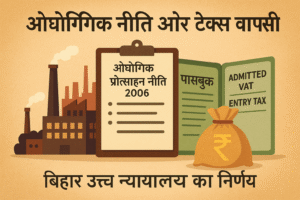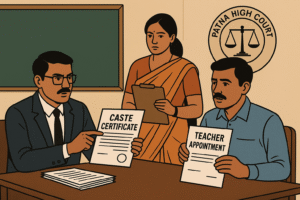The Patna High Court dismissed a writ petition challenging the award of a “handling and transportation” contract of the Bihar State Food & Civil Supplies Corporation (BSFC). The Division Bench—Hon’ble the Chief Justice and Hon’ble Mr. Justice Nani Tagia—held that a bidder who stood blacklisted for five years could not assail a later tender process, especially after failing to implead the successful bidders and after misreading the tender clause on replacement of vehicles. The judgment was delivered on 20 December 2024.
The petitioner had questioned the award flowing from NIT No. 723 dated 08.06.2024 for handling and transportation services. In brief, the petitioner’s case was that her own tender—earlier submitted under a prior NIT—was rejected on grounds that, according to her, were not applied to the eventual awardees under a subsequent NIT. The Court recorded that the earlier round had already led to the petitioner’s disqualification because she could not execute the agreement in time: the lease arrangements she relied upon with truck owners were cancelled, preventing compliance even during the extended period offered by the authorities. In that earlier writ (referred to as Annexure-P-3 in the record), the five-year blacklisting was also upheld. Thus, when the subsequent tender (Annexure-P-2) came, the petitioner—being blacklisted—did not even apply.
A central plank of the petitioner’s argument was Clause 11(xxv) of the tender conditions, which she said allowed substitution of vehicles. She contended that if the successful bidders were permitted to replace trucks, her case deserved similar treatment. The Bench carefully read the clause and clarified that the permission to replace applied only after execution of the agreement, not beforehand. In the factual matrix here, the successful Transporter-cum-Handling Agent executed the agreement on 25.10.2024, sought replacement on 26.10.2024, and therefore acted within the clause, whereas the petitioner never reached the stage of execution. Consequently, the Clause 11(xxv) argument failed on its own terms.
Equally fatal to the writ was non-impleadment: though the petitioner named the Transporter-cum-Handling Agents who were granted the award and who later sought replacement, she did not implead them as parties. The Court found this omission serious—allegations were being made behind the back of the affected parties—rendering the writ unsustainable.
Stepping back, the Bench characterized the petition as a collateral attack born out of “smarting under the disqualification and resultant blacklisting,” rather than a legitimate challenge invoking the Court’s extraordinary jurisdiction under Article 226. As a blacklisted entity, the petitioner had no standing to complain about the subsequent tender award process in which she was ineligible and did not participate. With allegations unsubstantiated and necessary parties absent, the Court declined interference and dismissed the writ as misconceived.
Simplified Explanation of the Judgment
This case involved government contracting for the movement and handling of food grains under the state corporation. The petitioner argued that she was unfairly treated in the tendering process. Earlier, she had been selected but could not complete the formal agreement because the truck owners from whom she had taken vehicles on lease backed out. Despite being given extra time, she failed to furnish a compliant fleet and sign the agreement. That failure led to her disqualification and, ultimately, a five-year blacklisting—an outcome previously sustained by the High Court in an earlier writ (Annexure-P-3).
Later, the corporation re-tendered the work. The petitioner said the successful bidders were allowed to “replace” vehicles after the agreement, whereas she was not allowed similar flexibility earlier. The High Court examined the tender clause (Clause 11(xxv)) relied on by the petitioner and made an important distinction: the clause permits substitution of vehicles only after the contract is signed. In other words, once you have a validly executed agreement, you can seek to replace a vehicle (say, for maintenance or compliance reasons) by following the process. But that does not mean a bidder who has not executed the agreement can rely on the clause to cure deficiencies that prevent execution in the first place.
Here, the record showed that the successful Transporter-cum-Handling Agent executed the agreement on 25 October 2024 and sought replacement the very next day, 26 October 2024—squarely within the clause. The petitioner, by contrast, never reached the “agreement executed” stage in the earlier round because her leased trucks were withdrawn and she could not meet the requirements within the time granted, even with an extension. Thus, the foundation of parity she claimed simply did not exist.
The Court also underscored a basic rule of writ litigation: if you allege wrongdoing by a party, you must implead that party so the Court can hear both sides. The petitioner named the Transporter-cum-Handling Agents who got the award but chose not to implead them. This alone made the petition defective. Without the presence of necessary parties, the Court cannot adjudicate allegations that affect them.
Finally, because the petitioner was already blacklisted for five years (a finding the Court had previously upheld), she could not complain about a subsequent tender in which she was ineligible and did not even participate. Courts exercising writ jurisdiction typically refrain from entertaining speculative or collateral grievances by non-participants—especially where the grievance stems from one’s own disqualification rather than a demonstrable illegality in the later process. On these cumulative reasons, the Bench dismissed the writ as “misconceived.”
Significance or Implication of the Judgment (For general public or government)
This decision reinforces important procurement principles:
- Blacklisting has real consequences. A bidder who is blacklisted cannot attack future tenders as an aggrieved participant unless the blacklisting itself is overturned; merely disagreeing with subsequent awards is insufficient.
- Clause interpretation matters. Flexibility clauses—like permission to replace vehicles—operate within their precise timeframes (here, after agreement execution). They cannot be retrofitted to excuse inability to execute the contract.
- Implead necessary parties. If you are challenging an award or alleging irregularities against successful bidders, they must be added to the case; otherwise, the Court will not adjudicate behind their back.
- Article 226 is not for ventilating anger. Writ jurisdiction is discretionary and equitable; it is not a platform for collateral attacks on procurement processes by those who were ineligible or chose not to participate.
Legal Issue(s) Decided and the Court’s Decision with reasoning
- Whether a blacklisted bidder can challenge the award of a subsequent tender in which the bidder did not participate.
Decision: No. The Court held that a bidder under a five-year blacklisting, already affirmed in earlier proceedings, cannot maintain a writ against the later award process. There is no locus as an aggrieved participant. - Whether Clause 11(xxv) of the tender permitted pre-execution substitution of vehicles to cure an inability to execute the contract.
Decision: No. The clause allows replacement after execution of the agreement. The successful Transporter-cum-Handling Agent executed the agreement on 25.10.2024 and requested replacement on 26.10.2024, which was within the clause; the petitioner never executed any agreement. - Effect of non-impleadment of successful bidders against whom allegations are made.
Decision: Fatal to the writ. Allegations cannot be considered in the absence of necessary parties; the petition was thus defective and misconceived. - Whether Article 226 should be invoked to test generalized grievances post-disqualification.
Decision: No. The Court declined to exercise extraordinary jurisdiction where the grievance stemmed from blacklisting and not from any demonstrated illegality in the later tender process. The writ was dismissed.
Case Title
Sita Devi vs. State of Bihar & Others
Case Number
Civil Writ Jurisdiction Case (CWJC) No. 19215 of 2024
Citation(s)
2025 (1) PLJR 558
Coram and Names of Judges
Hon’ble the Chief Justice; Hon’ble Mr. Justice Nani Tagia
Names of Advocates and who they appeared for
- For the petitioner: Mr. Rajendra Narain, Sr. Advocate; Mr. Uday Kumar, Advocate
- For BSFC: Mr. Anjani Kumar, Sr. Advocate; Mr. Shailendra Kumar Singh, Advocate
- For the State: Mr. Amit Prakash, Government Advocate-13; Mr. D.K. Singh, Advocate
Link to Judgment
MTUjMTkyMTUjMjAyNCMxI04=-jniiGGuAdeY=
If you found this explanation helpful and wish to stay informed about how legal developments may affect your rights in Bihar, you may consider following Samvida Law Associates for more updates.








